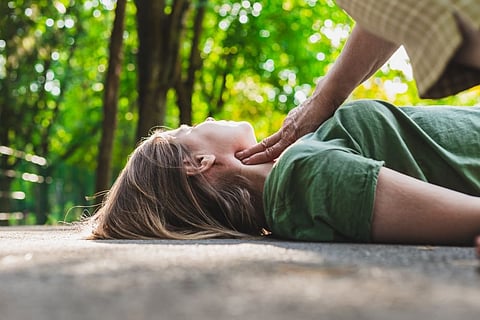THURSDAY, Sept. 21, 2023 (HealthDay News) -- Women are significantly less likely to receive bystander cardiopulmonary resuscitation (BCPR) than men when experiencing out-of-hospital cardiac arrest (OHCA) in a public location, according to a study presented at the annual European Emergency Medicine Congress, held from Sept. 17 to 20 in Barcelona, Spain.
Sylvie Cossette, Ph.D., from the University of Montreal, and colleagues examined the interaction between age, gender, location, and rates of BCPR in OHCA patients. The analysis included 39,391 adult patients with nontraumatic, bystander-witnessed OHCA.
The researchers found that 54 percent of participants received BCPR, 23 percent of which occurred in public locations; 39 percent had an initial shockable rhythm, and 18 percent survived to discharge. There was a three-way interaction seen between patient gender, OHCA location, and age, which showed that in public locations, women were less likely to receive BCPR than men (adjusted odds ratio [aOR], 0.72; 95 percent confidence interval [CI], 0.64 to 0.81). There was no significant difference between men and women in private locations (aOR, 1.01; 95 percent CI, 0.96 to 1.06; P = 0.67). In public locations, there was no interaction between age and gender for OHCAs, but there was a significant interaction for OHCAs in private locations. Older age was strongly associated with reduced odds of receiving BCPR for men experiencing OHCA in private locations (aOR for a 10-year increase in age, 0.91; 95 percent CI, 0.90 to 0.93; P < 0.001). This association was weaker for women in private (aOR for a 10-year increase in age, 0.97; 95 percent CI, 0.94 to 0.99; P = 0.011).
"We don't know why this is the case," coauthor Alexis Cournoyer, M.D., also from the University of Montreal, said in a statement. "It could be that people are worried about hurting or touching women, or that they think a woman is less likely to be having a cardiac arrest."
Press Release
More Information


